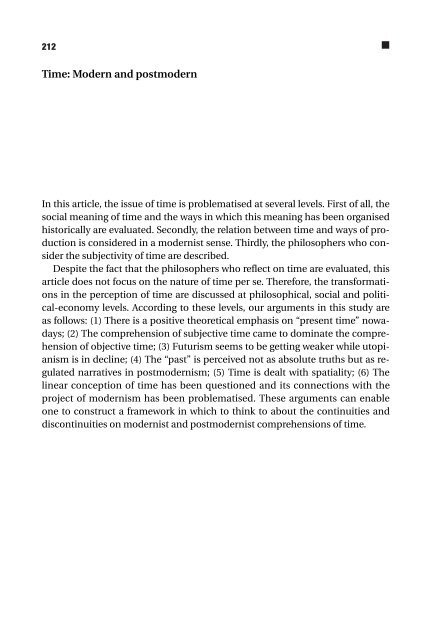ZAMAN: MODERN VE POSTMODERN 211 Global Change içinde, (der.) J. Bird, B. Curtis, T. Putnam, G. Robertson, L. Ticker, Routledge, Londra, 47-58. Giddens, Anthony (1994) Modernliğin Sonuçları, (çev.) E. Kuşdil, Ayrıntı, İstanbul. Harvey, David (1997) Postmodernliğin Durumu, (çev.) Sungur Savran, Metis, İstanbul. Heidegger, Martin (1996) “Zaman Kavramı”, Zaman Kavramı içinde, (çev.) S. Babür, İmge, Ankara. Heidegger, Martin (1997b) “Zaman Kavramı”, (çev.) D. Şahiner, Cogito: Zaman 12’ye 1 Var içinde, sayı 11, YKY, İstanbul. Jameson, Frederic (1992) Postmodernizm: Ya da Geç Kapitalizmin Kültürel Mantığı, YKY, İstanbul. Jenkins, Keith (1997) Tarihi Yeniden Düşünmek, (çev.) B. S. Şener, Dost, Ankara. King, Anthony (1995) “The times and spaces of modernity (or who needs postmodernism)”, Global Modernities içinde, (der.) M. Featherstone, S. Lash ve R. Robertson, Sage, Londra, 108- 123. Köker, Levent ve Ağaoğulları, Mehmet Ali (1997) Tanrı Devletinden Kral Devletine, İmge, Ankara. Lawrence, N. (1986) “The origins of time”, Time, Science, Society in China and the West: The Study of Time içinde, (der.) J.T. Fraser, N. Lawrence, F. C. Haber, University of Massachusetts Press, Amherst. Levitas, Ruth (1993) “The future of thinking about the future”, Mapping The Futures: Local Cultures and Global Change içinde, (der.) J. Bird, B. Curtis, T. Putnam, G. Robertson, L.Ticker, Routledge, Londra, 257- 266. Massey, Doreen (1993) “Power- geometry and progressive sense of place”, Mapping The Futures: Local Cultures and Global Change içinde, (der.) J. Bird, B. Curtis, T. Putnam, G. Robertson, L. Ticker, Routledge, Londra, 59-69. Minc, Alain (1995) Yeni Ortaçağ, (çev.) M. A. Ağaoğulları, İmge, Ankara. Morris, Meaghan (1993) “Future fear”, Mapping The Futures: Local Cultures and Global Change içinde, (der.) J. Bird, B. Curtis, T. Putnam, G. Robertson, L. Ticker, Routledge, Londra, 30-46. Soja, Edward (1989) Postmodern Geographies, Verso, Londra. Tester, Keith (1993) The Life and Times of Post-Modernity, Routledge, Londra. Therborn, Göran (1995) “Routes to/through modernity”, Global Modernities içinde, (der.) M. Featherstone, S. Lash ve R. Robertson, Sage, Londra, 124- 139. Virilio, Paul (1998) Hız ve Politika, (çev.) Meltem Cansever, Metis, İstanbul.
212 ■ Time: Modern and postmodern In this article, the issue of time is problematised at several levels. First of all, the social meaning of time and the ways in which this meaning has been organised historically are evaluated. Secondly, the relation between time and ways of production is considered in a modernist sense. Thirdly, the philosophers who consider the subjectivity of time are described. Despite the fact that the philosophers who reflect on time are evaluated, this article does not focus on the nature of time per se. Therefore, the transformations in the perception of time are discussed at philosophical, social and political-economy levels. According to these levels, our arguments in this study are as follows: (1) There is a positive theoretical emphasis on “present time” nowadays; (2) The comprehension of subjective time came to dominate the comprehension of objective time; (3) Futurism seems to be getting weaker while utopianism is in decline; (4) The “past” is perceived not as absolute truths but as regulated narratives in postmodernism; (5) Time is dealt with spatiality; (6) The linear conception of time has been questioned and its connections with the project of modernism has been problematised. These arguments can enable one to construct a framework in which to think to about the continuities and discontinuities on modernist and postmodernist comprehensions of time.


